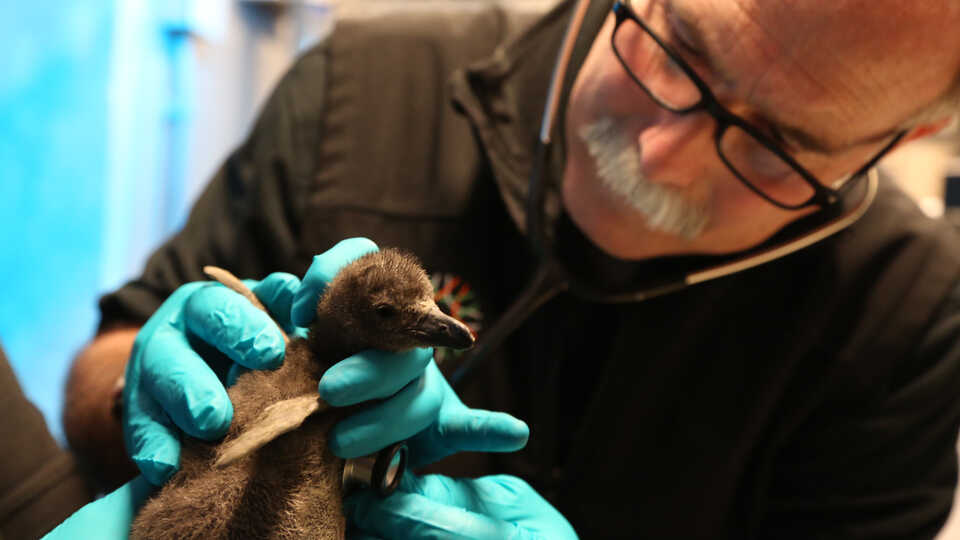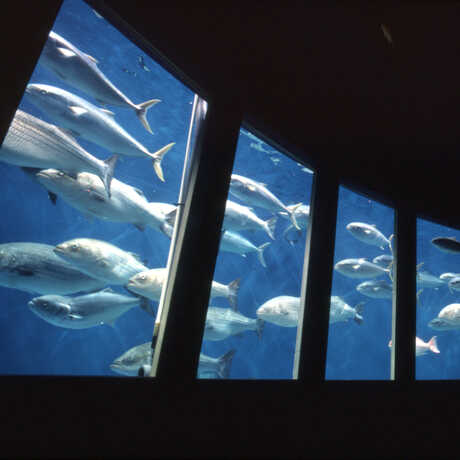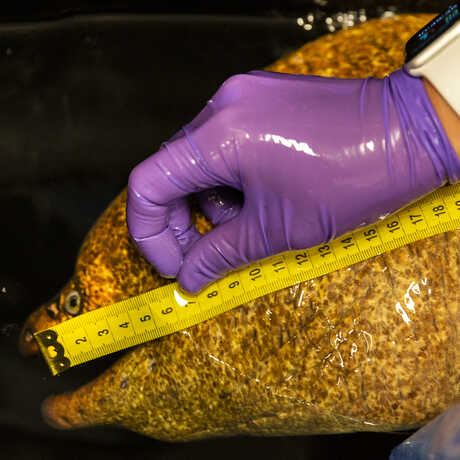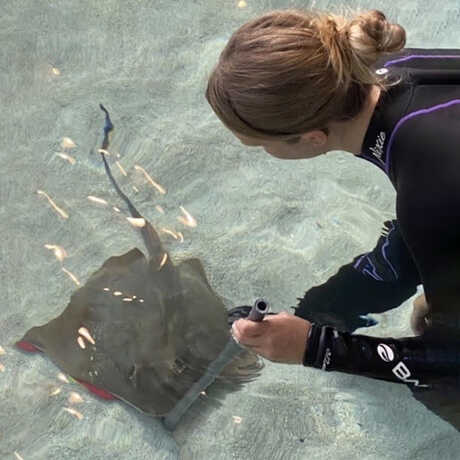From our smallest butterfly to our largest reptile, Claude, the Academy is dedicated to providing exceptional care and lifelong opportunities for our 60,000 aquarium and rainforest animals to thrive.
Accredited by the Association of Zoos and Aquariums (AZA) since 1994, the California Academy of Sciences meets the highest standards in animal care and wellbeing, while also providing a fun, safe, and educational experience for visitors of all ages. The Academy also joins other AZA zoos and aquariums in dedicating millions of dollars annually to support scientific research, conservation, and education programs.
The Academy strongly believes that the wellbeing of the animals in our care is both a moral responsibility and foundational to our mission and values. Whether it's providing stimulating daily enrichment or world-class veterinary care, our animals are always our top priority—and our passion.
Explore this page:
Veterinary care >>
Animal enrichment >>
Animal welfare assessments >>
Conservation breeding program >>
AZA accreditation >>
Meet the Animal Care team >>
Veterinary care

The Academy has two staff veterinarians who safeguard the health of our animals at every life stage.
The biggest part of their job is maintaining the ongoing health of the animals, which involves performing physical examinations, administering treatments, and conducting necropsies to determine causes of death after an animal dies. The veterinarians also oversee the nutrition program for the aquarium's animals.
The frequency of veterinary exams varies by animal, from annually for animals such as penguins and grasshopper mice, to every three years for sharks and rays, to five years for Claude, our albino alligator.
Our Animal Health Department is also always ready to respond when a situation arises that requires urgent attention. Over the years, they have had to remove a shoe from Claude’s stomach while a fire alarm was going off and perform a C-section on a tiny dwarf seahorse using a magnifying glass, among other emergencies. They also have pioneered new treatments to treat a common tendon injury in baby penguins and remove sea spiders from the aquarium’s coral reefs without harming the corals.
Animal enrichment

Biologists at Steinhart Aquarium keep animals healthy and engaged in a variety of creative ways.
Enrichment serves two vital functions for animals like penguins, stingrays, and macaws:
- Enrichment helps the animals communicate and connect with their caregivers.
- Enrichment and training sessions allow the Animal Care team to monitor the health and wellbeing of our animals.
Enrichment activities and experiences vary widely from animal to animal. For stingrays, for instance, items such as fabricated grasses and algaes, and textured mats are rotated through the habitat, similar to how their surroundings in the wild would constantly change, in order to keep their minds active and curious. Penguins may receive nesting materials, while macaws often receive puzzle feeders with treats hidden inside. And the highly intelligent giant Pacific octopus is engaged through daily enrichment sessions that include tactile sessions, items to manipulate, and puzzles, such as a jar that must be unscrewed to reach the food inside.
Animal welfare assessments

Aquarium staff perform regular rounds to ensure they receive a 360-degree view of animal health and wellbeing.
Animal welfare assessments are conducted in a variety of ways, from the biologists’ daily assessment of each animal in their care, to formal quarterly evaluations from the veterinarian, curators, and directors of Steinhart Aquarium.
Each animal or group of animals’ behavior, choice and control, and affective or mental states is reviewed with the biologists and curator no less than twice per year. During an annual assessment, the Animal Health and Animal Care teams evaluate nutrition, environment, and health of individuals, plus a review of all aspects of animal welfare.
Conservation breeding program

In addition to educating and engaging the public, the Academy directly contributes to critical animal conservation efforts.
Since 1995, all penguin chicks hatched at the Academy have been part of the AZA African Penguin Species Survival Plan. Institutions participating in this initiative aim to maintain the species' genetic diversity in captive populations through collaborative exchanges and strategic breeding. In October 2024, the International Union for Conservation of Nature uplisted African penguins from “endangered” to “critically endangered,” making the Academy’s penguin conservation work more urgent than ever.
As a leader in spawning corals and rearing starfish, the Academy also participates in AZA’s Saving Animals From Extinction (SAFE) Coral Program and SAFE Sunflower Sea Star Program.
AZA accreditation
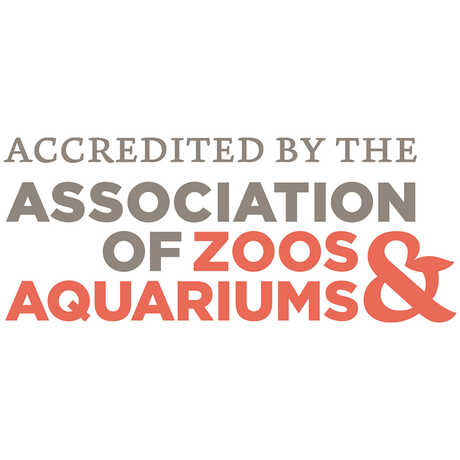
Less than 10% of the licensed 2,800 wildlife exhibitors in the U.S. meet the more comprehensive standards of AZA accreditation.
Every five years the Academy goes through a rigorous process to renew its accreditation with AZA, the independent accrediting organization for the best zoos and aquariums in the world. AZA-accredited facilities like ours meet the highest standards for animal care and welfare.
AZA requires member institutions to repeat the accreditation process every five years to ensure that they are upholding the continuously evolving standards, incorporating best modern zoological practices in animal welfare and management, and embracing modern AZA philosophies.
The Steinhart Aquarium Animal Welfare Program is structured in accordance with the AZA Animal Welfare Committee definition of welfare: an animal’s collective physical, mental, and emotional states over a period of time. An animal typically experiences good welfare when they are healthy, comfortable, well-nourished, safe, able to develop and express species-typical relationships, behaviors, and cognitive abilities, and not suffering from unpleasant states such as pain, fear, or distress.
Meet the Animal Care team
Click below to learn more about the Academy's Animal Care team.

Dr. Freeland Dunker is a consulting and relief veterinarian for other Bay Area zoos and aquariums, serves as an Association of Zoos and Aquariums inspector, and helped develop the Aquatic Animal Health Fellowship Program here at the Academy.
Since he began working as a veterinarian at the Academy 30 years ago, Dunker’s job has included everything from treating dolphins for respiratory issues to removing a shoe from Claude’s stomach—while a fire alarm was going off.
Before coming to the Academy full time, he worked at the San Francisco Zoo, where some hazards of the job included getting kicked by a giraffe. One of Dunker’s major accomplishments at the San Francisco Zoo was curing an elephant of human tuberculosis.
Before becoming a zoo veterinarian, Dunker spent seven years in private practice, treating cattle, horses, sheep, dogs, and cats.

Lana Krol has been working in zoos and aquariums for over 10 years. She became an Academy veterinarian in 2021 and is responsible for the medical care of the Academy's living collection, which includes everyone from Claude to the insects. In 2024, she also had the opportunity to work with "Mirage" the corpse flower, who was her first plant patient.
Originally from the Ukraine, Krol emigrated to the United States with her family in 1989 and grew up in California. She obtained her veterinary education at the University of Illinois with a focus in aquatic and zoo animal medicine, and underwent postgraduate training at the Los Angeles Zoo. Before joining the Academy team, she was a staff veterinarian at the San Francisco Zoo.
Krol is a published author in both veterinary scientific journals and textbooks, and lectures at the UC Davis College of Veterinary Medicine. She is currently also a relief veterinarian for other local zoos as well as several pet hospitals in the Bay Area.

As Senior Director of Steinhart Aquarium, Bart Shepherd oversees all plant and animal care and welfare, the veterinarian and animal health team, as well as the Academy’s robust scientific diving program.
A coral reef biologist, Shepherd is also co-director of the Academy’s Hope for Reefs initiative, which aims to reverse the decline of global coral reefs. A technical rebreather SCUBA diver, Shepherd is also instrumental in an Academy initiative to explore ocean life at depths of between 60 and 150 meters, a region popularly known as the “coral reef twilight zone.”
Shepherd has worked at Steinhart Aquarium for 27 of its 100-year existence, which is more than half of his life. In the broader zoo and aquarium professional community, Shepherd is the leader of the AZA Coral SAFE Program, vice-chair of the AZA Aquatic Collections Sustainability Committee, and a member of the AZA Aquarium Affairs Committee.

Brenda Melton has 30 years of experience working with a wide variety of native and exotic animals, including birds, reptiles, amphibians, fishes, invertebrates, hoofstock, carnivores, and primates.
She joined the Academy as the assistant curator of Steinhart Aquarium in 2008, just before the opening of the Academy’s new building, and became director of animal care and wellbeing in 2022, overseeing animal and plant care, collection planning, behavioral husbandry, and animal welfare for the resident animals. Melton is an AZA inspector, advisor on the AZA Behavior Scientific Advisory Group, and the vice program leader for the AZA African Penguin Saving Animals from Extinction program.
Before the Academy, she worked at the San Francisco Zoo for seven years, managing care for many different animals with a focus on the avian collection. Before working at the San Francisco Zoo, she was an animal keeper at the Oakland Zoo and a wildlife biologist with the Ventana Wildlife Society, releasing and tracking California condors in Big Sur.
To ensure that animal welfare is always the highest priority, it is important that staff, volunteers, and the public are able to bring forward any questions or concerns they have about animal welfare. If you have a comment, please click below to submit a form that will be shared with the Academy’s Animal Welfare Committee. We'll be sure to address your inquiry and respond in a timely manner. Reporting may be anonymous.
